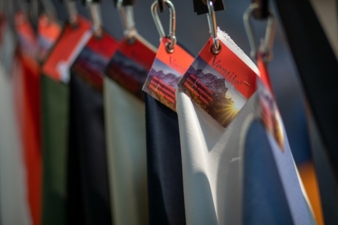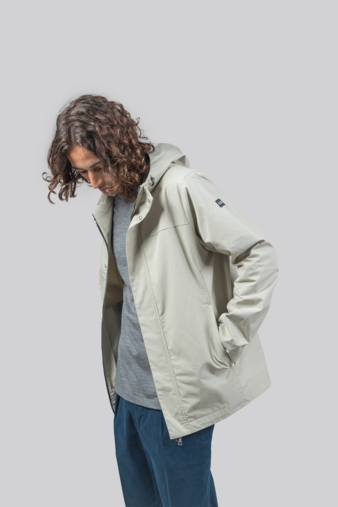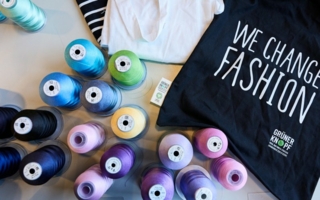02/09/2025 – The eco-fabric movement
How sustainability is reshaping textiles
In recent years, the fashion and textile industry has witnessed a profound transformation driven by a more informed and environmentally aware consumer base. The global shift is reshaping the industry, not just in clothing design, but down to the fibres, fabrics, and accessories used in garment production.
Traditional fashion was once synonymous with fast trends, mass production and synthetic materials. However, today’s consumers are becoming more mindful, influenced by values including environmental impact, ethical production and material transparency. While price, aesthetics, and brand reputation still matter, they are no longer the core drivers when it comes to a purchasing decision – consumers now seek products that align with their personal values, from sustainably sourced fabrics to fair working conditions and low-waste.
A shift toward authenticity, longevity and natural fibres
Growing concerns over microplastics, fast fashion overconsumption, and the carbon footprint of textiles have led to rising demand for alternative options in apparel and accessories. In a saturated market, consumers are gravitating towards authentic brands that show integrity, make a positive impact, and create an end-product built to last. Natural fibres like organic cotton, wool, hemp, linen, and jute, sourced from renewable plants and animals, have long been staples in textiles and remain central to sustainable fashion. Biodegradable, breathable, and less energy-intensive than synthetics, they are being revived for their low impact and timeless appeal. Thanks to innovations in dyeing, processing, and blending, these fibres now offer improved softness, durability, and performance.
Emerging eco trends
Ventile’s Eco collection was introduced in 2019 with a line of 100% recycled cotton fabrics manufactured from pre-consumer cotton waste from apparel, home furnishings and bed-linen industries. The range has since expanded due to rapid growth, adding more variety in organic, hemp, linen and lyocell blends – all of which are GOTS, GRS and Oeko-Tex certified. The Eco collection was born out of a need to deliver the optimum balance of performance, comfort, and sustainability, whilst reducing textile waste and providing a durable resource for brands and designers to set a new standard for eco-conscious performance fabrics.
The growing demand for natural fabrics is fuelling a new era of apparel and accessories that blend conscious design with timeless, effortless style.
Developing and emerging trends in textile manufacturing include:
Organic cotton
Naturally soft and breathable fabric, organic cotton is grown without toxic chemicals, ensuring a cleaner process from seed to fabric. It is a popular and conscious choice for comfort and sustainability. Ventile’s Brand Manager, Daniel Odermatt, adds: “Ventile Organic is woven from premium extra-long-staple cotton that represents only 0.04% of the overall cotton produced worldwide. This unique fully twisted cotton yarn increases garment durability and lifespan. This reduces the unnecessary frequency of consumer purchases, limiting the negative impact of textiles production upon the environment.”
Biodegradable trims and zips
As sustainability becomes central to fashion design, the focus is shifting beyond just fabrics. Alternative trims and zips are emerging as essential elements in sustainable apparel, made from natural or compostable materials such as corrosion-free metals, wood, biodegradable polymers, and more.
Recycled and upcycled fabrics
From reducing textile waste to lowering carbon emissions, these fabrics offer a powerful solution to multiple environmental challenges. By reusing existing materials like plastic bottles, discarded garments, or fabric off-cuts, they minimise the need for virgin resources and prevent waste from ending up in landfills or oceans. This conserves energy and water, cutting down on fashion’s environmental footprint.
Hemp and linen
Sustainably grown, they require minimal water and no pesticides or herbicides. Both plants thrive with minimal intervention and help to restore soil health, making the fibres ideal for regenerative farming. Renowned for its breathability, durability, and natural water resistance, Ventile’s “Eco Hemp 205” fabric combines the best of nature and innovation. The premium textile blends strong hemp fibres with extra-long-staple organic cotton, resulting in a high-performance, eco-conscious fabric designed for comfort, longevity, and low environmental impact. Ventile’s Brand Manager, Daniel Odermatt, commented: “It’s the exceptional properties of hemp, including strength, durability, and breathability, combined with its natural origins, that make it the perfect fit for the Ventile ECO range. Much like our premium cotton, hemp fibres get better with time, only helping to enhance the fabric’s character.”
Partnerships driving change
As the fashion industry shifts its focus, leading brands are increasingly collaborating to advance the use of natural fibres in future-forward design and to challenge what is possible with technical textiles. Ventile has recently teamed up with plastic-free outdoor brand, Cévène, to support the launch of the brand’s debut collection. Cévène is 100% plastic-free, sitting among the 0.1% of brands that use zero plastic and exclusively 100% single-material fabrics. The collaboration marks a key milestone in championing environmentally responsible innovation within the textile and fashion industries. The brands have come together to showcase their shared mission: to design, produce, and distribute a wardrobe that has the lowest possible impact on the planet, both today and for generations to come. On the partnership, Ventile Brand Director, Daniel Odermatt said: “We are thrilled to support the team at Cévène on the launch of their new brand. Their philosophy is rooted in the Seven Generations Principle, which considers the impact over the next 140 years, spanning seven future generations. That’s something that deeply resonates with what we do at Ventile, meeting the needs of the present without compromising future generations.”
As the fashion and textile industry redefines its values, the shift toward natural, sustainable materials is no longer a niche. From fibre to finish, brands, manufacturers, and consumers alike are embracing innovation that honours both craftsmanship and environmental responsibility. With increasing collaboration, technological advances, and demand for transparency, sustainable fashion is evolving beyond trends to become the new standard for many around the world. As pioneers like Ventile and Cévène show, it’s possible to create beautiful, functional garments that respect the planet.





